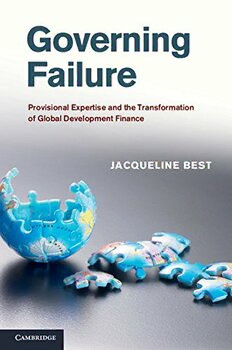Table Of ContentGoverning Failure
Jacqueline Best argues that the changes in International Monetary
Fund,WorldBankanddonorpoliciesinthe1990s,towardswhatsome
have called the ‘Post-Washington Consensus,’ were driven by an ero-
sion of expert authority and an increasing preoccupation with policy
failure. Failures such as the Asian financial crisis and the decades of
despairinsub-SaharanAfricaledtheseinstitutionstodevelopgovern-
ance strategies designed to avoid failure: fostering country ownership,
developing global standards, managing risk and vulnerability, and
measuring results. In contrast to the structural adjustment era when
policymakers were confident that they had all the answers, the author
arguesthatwearenowinaneraofprovisionalgovernance,inwhichkey
actorsareawareofthepossibilityoffailureevenastheyseektoinoculate
themselvesagainstit.Thisbookconsiderstheimplicationsofthisshift,
askingifitisapositivechangeandwhetheritissustainable.
jacqueline best isanAssociateProfessorintheSchoolofPolitical
Studies at the University of Ottawa. Her work focuses on the social,
cultural and political underpinnings of the global economic system,
which she studies by examining how organizations such as the Inter-
nationalMonetaryFundandtheWorldBankworktogoverntheglobal
economy.
Governing Failure
Provisional Expertise and the Transformation of
Global Development Finance
Jacqueline Best
UniversityPrintingHouse,CambridgeCB28BS,UnitedKingdom
PublishedintheUnitedStatesofAmericabyCambridgeUniversityPress,
NewYork
CambridgeUniversityPressispartoftheUniversityofCambridge.
ItfurtherstheUniversity’smissionbydisseminatingknowledgeinthepursuitof
education,learningandresearchatthehighestinternationallevelsofexcellence.
www.cambridge.org
Informationonthistitle:www.cambridge.org/9781107035041
©JacquelineBest2014
Thispublicationisincopyright.Subjecttostatutoryexception
andtotheprovisionsofrelevantcollectivelicensingagreements,
noreproductionofanypartmaytakeplacewithoutthewritten
permissionofCambridgeUniversityPress.
Firstpublished2014
PrintedintheUnitedKingdombyClays,StIvesplc
AcataloguerecordforthispublicationisavailablefromtheBritishLibrary
LibraryofCongressCataloguinginPublicationdata
Best,Jacqueline,1970–
Governingfailure:provisionalexpertiseandthetransformationofglobal
developmentfinance/JacquelineBest.
pagescm
Includesbibliographicalreferencesandindex.
ISBN978-1-107-03504-1(Hardback)
1. Economicdevelopment–Finance. 2. Economicassistance. 3. Development
banks. 4. Nongovernmentalorganizations. 5. Corporategovernance. I. Title.
HD75.B49652014
332.1’53–dc23 2013028563
ISBN978-1-107-03504-1Hardback
CambridgeUniversityPresshasnoresponsibilityforthepersistenceoraccuracyof
URLsforexternalorthird-partyinternetwebsitesreferredtointhispublication,
anddoesnotguaranteethatanycontentonsuchwebsitesis,orwillremain,
accurateorappropriate.
Contents
List of figures page vi
Acknowledgements vii
List of abbreviations ix
Part I Understanding how globalgovernance works 1
1 Introduction 3
2 Ameso-levelanalysis 20
Part II History 43
3 What camebefore 45
4 Transformations 66
Part III New governance strategies 89
5 Fostering ownership 91
6 Developing global standards 115
7 Managing risk and vulnerability 139
8 Measuring results 164
Part IV Conclusion 187
9 The politics offailure and the future ofprovisional
governance 189
Endnotes 209
List of peopleinterviewed 263
Index 266
v
Figures
8.1 The LOGFRAME page 170
8.2 CIDA’s results chain 173
vi
Acknowledgements
In the almost seven years that I have been working on this book in one
form or another, I have collected a number of debts to colleagues,
research assistants and friends.
I would like to start by thanking those colleagues who generously
commented on one or more chapters of the final manuscript, including
Michael Orsini, Paul Langley, Michael Best, Tony Porter, André
BroomeandWilliamWalters.Anumberofothershavecommentedover
the years on earlier versions of these chapters, including Mat Paterson,
Alexandra Gheciu, Iver Neumann, Lindsey McGoey, Stefano Guzzini,
Arne Rückert, Ole Jacob Sending, Len Seabrooke, Rob Aitken, David
Black,RodneyBruceHall,KateWeaver,MarkBlyth,CharlotteEpstein,
Eric Helleiner, Bessma Momani, Randall Germain and Susan Park.
Earlierversionsofseveralchapterswerepresentedatanumberofwork-
shops,conferencesandtalks.Manyofthesetalksprovidedcrucialfeedback
on the central theoretical and methodological arguments of this volume.
I was particularly inspired by the discussions during workshops at the
CopenhagenBusinessSchoolon“TheBusinessofInternationalOrganiza-
tions,”andattheEuropeanConsortiumforPoliticalResearchon“Diffusion
ofAuthority,”togetherwithtalksattheUniversityofQueensland,theUni-
versityofOxford,theNorwegianInstituteofInternationalAffairs,theNorth-
SouthInstitute,theUniversityofWarwickandtheUniversityofSydney.
IamfortunatetobeworkinginanenvironmentwhereIamsurrounded
by some excellent minds. Many of the ideas in this book are inspired
by conversations with friends and colleagues at the University of Ottawa
andCarletonUniversity,includingKevinMcMillan,DalieGiroux,Stephen
Brown, Nisha Shah, Paul Saurette, Susan Spronk, Patrick Leblond,
Laura Macdonald, Hélène Pellerin, Kathryn Trevenen and Marie-Josée
Massicotte.IamalsoindebtedtotheparticipantsoftheInternationalPolit-
icalEconomyNetworkseminarattheUniversityofOttawawhereIwasable
topresentanoverviewoftheprojecttowardstheendofthewritingprocess.
I benefitted from some excellent research and editorial assistance in
producingthisvolume.IwouldparticularlyliketothankMarieLangevin
vii
viii Acknowledgements
andKaileyCannonfortheirsuperbresearchandeditorialskills,without
which this book would not have been possible. Phillipe Roseberry,
Robert MacNeil, Maxime Ouellet and Dan Furukawa Marques also
helped enormously through their researchassistance.
The research for this book was supported financially by the Social
Sciences and Humanities Research Council of Canada, together with
theFacultyofSocialSciencesattheUniversityofOttawa.Ialsobenefit-
ted from research leave spent at the University of Oxford – where
I enjoyed support from the Global Economic Governance Centre, the
DepartmentofInternationalDevelopmentandtheInstituteforScience,
Innovation and Technology – and at the University of Queensland’s
School of Political Science and International Studies. I would like to
thank Ngaire Woods, Rodney Bruce-Hall, Steve Woolgar and Roland
Bleiker for making me welcome at these institutions.
I was also fortunate in being able to benefit from access to several
archival collections in researching this book, including the International
Monetary Fund (IMF) Archives, the World Bank Archives and the
British National Archives. Premela Isaac and Jean Marcoyeux at the
IMF Archives and Sherinne Thompson at the World Bank Archives
provided invaluable assistance.
Parts of Chapter 5, “Fostering ownership,” appeared in Third World
Quarterly, 28 (3), 2007, and parts of Chapter 7, “Managing risk and
vulnerability,”appearedinThirdWorldQuarterly,34(2),2013.Bothare
reproduced here with the permission of Taylor and Francis, www.tand-
fonline.com.
Figure 8.1, “The LOGFRAME,” is reproduced from a report pre-
pared for the United States Agency for International Development
(USAID): Project Analysis and Monitoring Company. 1980. “The
Logical Framework.” Prepared for the United States Agency for Inter-
national Development, Document # PN-AAR-443. Washington, DC.
The report is available through the USAID Development Experience
Clearinghouse: http://pdf.usaid.gov/pdf_docs/PNAAR443.pdf.
Figure8.2,“CIDAresultschain,”isreproducedfromaGovernmentof
Canada official document: CIDA. 2008. “Results-based Management –
2008 Policy Statement: Amended Terms and Definitions.” Gatineau:
Canadian International Development Agency. Available from www.acdi-
cida.gc.ca/acdi-cida/acdi-cida.nsf/eng/ANN-102094249-J4B. The repro-
ductionhasnotbeenproducedinaffiliationwith,orwiththeendorsement
of,theGovernmentofCanada.
Finally,Iwouldliketothankmyhusbandandpartner,PaulTyler,for
hissupportandencouragementoverthepastyearsasInavigatedtheups
and downsof the research and writing process.

